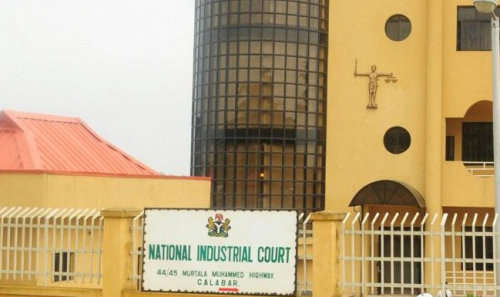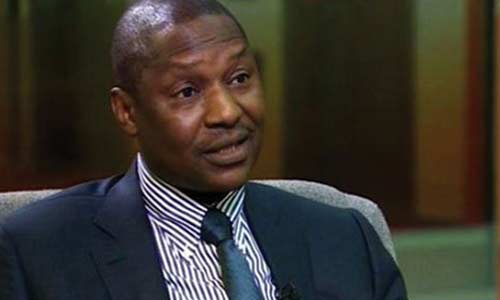COURTROOM NEWS 15/08/2023
Court Orders CBN to Pay Reinstated Federal Urban Mass Transit Staff N2.8bn

The National Industrial Court in Abuja, has ordered the Central Bank of Nigeria (CBN) to pay the sum of N2.8 billion to the 313 reinstated staff of the Federal Urban Mass Transit Agency, over the illegal and unlawful termination of their appointments.
The order which was contained in a judgment delivered by Justice E. N Agbakoba, in a garnishee proceedings marked NICN/ABJ/228M/2022, finally brought an end to the over 16 years legal battle at the industrial court.
The suit was brought by the judgment creditors whose appointments were unlawfully terminated by the judgment debtors listed as the President, Federal Republic of Nigeria; Head of Service of the Federation; Minister, Federal Ministry of Transportation and Federal Urban Mass Transit Agency.
The judgment creditors/applicants were all staff of the defunct Federal Urban Mass Transit Agency, a parastatal under the Federal Ministry of Transport, whose employment was in accordance with the Federal Civil Service Rules.
The litigation was as a result of the winding up of the agency, following which the government sometimes on November 13, 2004, issued letters of retirement from service to the applicants, although the letters were backdated to August 31, 2004.
In the suit marked NICN/ABJ/324/2013, filed by Julius Komgbenda and 313 others, the complaints had challenged the purported retirement describing it as illegal and unlawful as it did not comply with the provisions of the 1999 Constitution or the Public Service Rules 2008.
They claimed that under the Civil Service Rules under which they were employed, they had not attained the statutory age of 60 years and as such, they were entitled to be transferred and or be seconded to other government ministries, agencies or parastatals, adding that they were not given formal notice or paid any allowances in lieu of notice as at the time of retirement.
In her judgment delivered on December 16, 2020, Justice Agbakoba, had held that evidence presented before the court proved that the claimants were statutory employees of the federal government.
Accordingly, she had made an order declaring their purported retirement as untimely, unlawful, null and void and of no effect as it did not comply with the provisions of the 1999 Constitution or the Public Service Rules 2008.
In addition, the court granted an order reinstating the claimants to their offices and positions.
“An order of this court to the effect that all salaries/wages due to the claimants before and during the commencement of this suit should be paid to them accordingly until their employment are properly and legally determined or by retirement,” the court had held.
However, three years after the above judgment, the listed judgment debtors refused to comply with the judgment necessitating the judgment creditors to commenced a garnishee proceedings against them in suit No NICN/ABJ/228M/2022.
But on June 14, 2023, the court entered judgment in favour of the judgment creditors as follows: ” The order of garnishee nisi made on October 18, 2022 against the 2nd garnishee (CBN) is herein and hereby made absolute, the garnishee is hereby ordered to pay the judgment sum of N2, 800, 000, 000.00 being the judgment debt from the 2nd garnishee to the judgment creditor or so much thereof that will satisfy the judgment of this court delivered on 16th December 2020 in favour of the judgment creditor which sum has not been satisfied.”
Justice Agabakoba held that: “In this suit the judgment debtors, in fact all four judgment debtor filed frivolous processes arguing law and raising spurious academic submissions on issues that had long been settled in the law.
“I do not consider that the position taken by the judgment debtors in this suit can be described to be of a limited circumstance as recommended by the apex court. I find that the motions of the 1st -4th judgment debtors lack merit and are hereby dismissed with a cost of N500, 000.00 each.
“It is not the business of a Garnishee to undertake to play the role of an advocate for a judgment debtor by trying to shield and protect the money of the judgment debtor. Of course, by playing games of hide and seek with the court, by failing or refusing to depose to affidavit to show cause, disclosing the true account status of the judgment debtor, the garnishee only exposes itself to trouble, daring the court to do its worst.
“It can therefore be made to pay the debt of the judgment debtor, if the court has cause to believe that the failure or refusal to show cause is a deliberate attempt to evade a legal duty under the law, to disclose the true state of account of the judgment debtor in its custody.
“In the circumstances, it needs to be emphasised that it is not the duty of a garnishee to defend debt sought to be enforced against the judgment debtor. The duty of a garnishee upon receipt of Garnishee order nisi is to file before the relevant court an affidavit to show cause why the judgment debtor’s money in his custody should not be attached to satisfy the judgment debt.
“It then behooves a garnishee to present the true state of affairs regarding the monies before the court. Either there is no or insufficient fund in his custody or that the available fund is under lien or assigned to a third party in which case the court instead of proceeding to make an order for Garnishee absolute may order that any issue or question necessary for determining his liability be tried or determined.”



